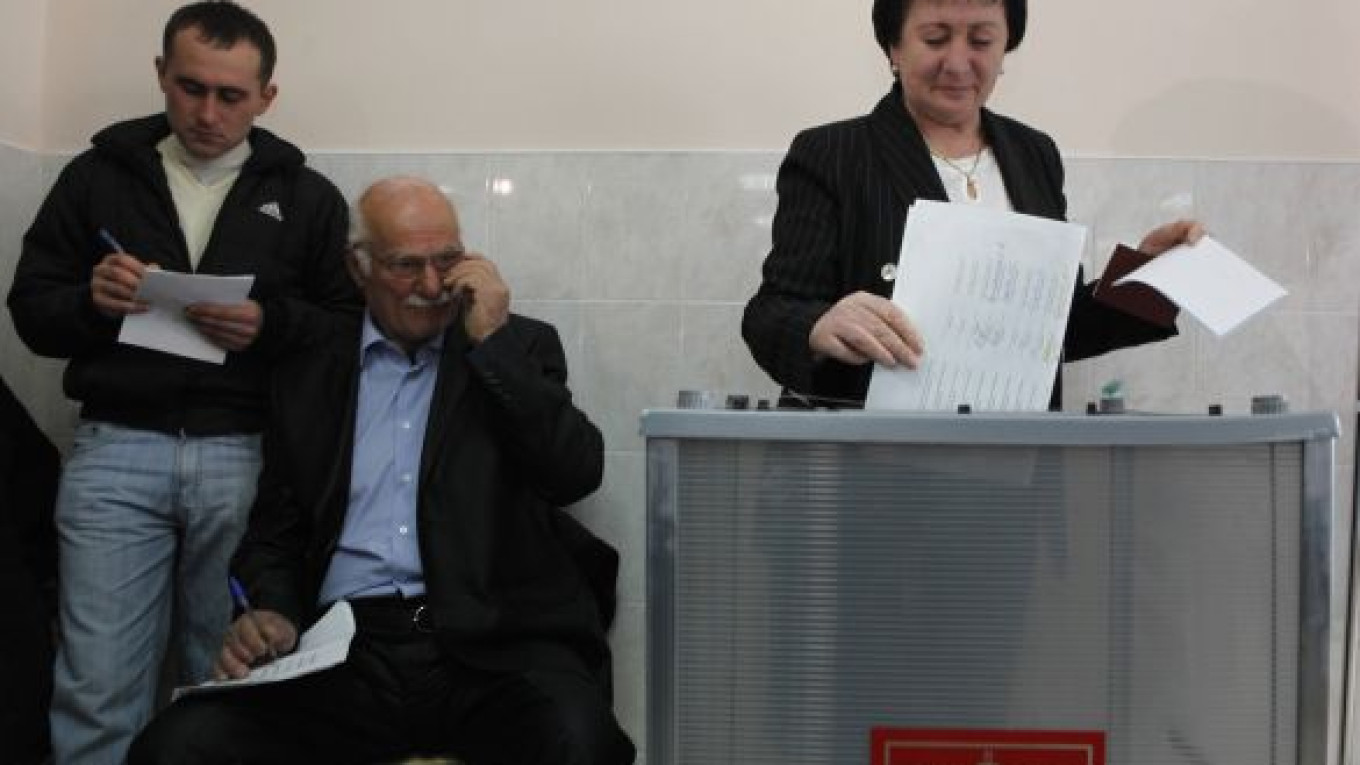Correction: An earlier version of this article misstated the name of one of the Pacific island nations that has recognized South Ossetia's independence. The island is Tuvalu, not Vanuatu.
This weekend's presidential election in South Ossetia ended with a surprise tie between the candidate supported by Moscow and a major opposition figure, authorities in the tiny Georgian breakaway region said Monday.
Analysts said the opposition candidate's strong showing indicates a high level of discontent among the local population with outgoing president Eduard Kokoity, whose government has been widely accused of misusing millions of dollars of aid sent by Moscow.
Emergency Situations Minister Anatoly Bibilov and former Education Minister Alla Dzhioyeva both scored 25 percent and will face each other in a Nov. 27 runoff, elections commission head Bella Pliyeva in a statement posted on the region's official web site.
Bibilov, who had open support from the Kremlin, got 25.44 percent — just 0.07 points, or about a dozen actual votes, more than Dzhioyeva, who had criticized outgoing president Kokoity as undemocratic, the statement said.
The figures were based on the counting of 98.84 percent of the vote. No final count was released by Monday.
The turnout in the republic of some 30,000 inhabitants was 67 percent, election officials said.
Kokoity has run the tiny mountainous region since 2001. He saw it through a five-day war in 2008, which ended with Russian forces defeating Georgia and recognizing the independence of South Ossetia and another breakaway province, Abkhazia.
But Kokoity is barred by the constitution from running for a third five-year term.
The former wrestler had thrown his weight behind two of the 11 candidates, but both Alan Kotayev and Georgy Kabisov fared poorly, winning just 9.6 percent and 7.5 percent of the vote, respectively.
Both candidates' campaigns were assisted by Modest Kolerov, a public relations veteran and former Kremlin official, Kommersant reported last week.
Kokoity said Monday that Dzhioyeva would never win the second round and suggested that no woman could become his successor. "Our society has high respect for women. But the Caucasus remains the Caucasus," he Komsomolskaya Pravda radio.
Kokoity has also been accused of preventing opposition candidates Dzambolat Tedeyev and Alan Kochiyev from taking part in the presidential race on questionable pretexts.
Kochiyev was imprisoned and charged with assaulting a local legislator last month. He his bid Friday in favor of the pro-Kremlin Bibilov.
Tedeyev, a former Soviet wrestling champion who serves as trainer of the Russian national wrestling team, was barred from the race on the grounds that he had not lived in South Ossetia permanently for the past 10 years.
The decision by the elections commission last month led to tensions when Tedeyev's supporters attempted to storm the commission's building in the regional capital Tskhinvali.
On Nov. 1, Tedeyev published a YouTube video in which he backed Dzhioyeva's candidacy.
Dzhioyeva, 62, was dismissed from her job as education minister in 2008 and brought to trial on embezzlement charges, which she has called politically motivated.
On Monday, she accused her opponents of unfair campaigning: "Unlike many of our competitors, we won without administrative resources, without colossal financial input and without any support from certain groups in the Russian political elite," she was quoted as saying on the republic's .
Experts also said Bibilov's relatively poor showing was a sign of anti-Russian sentiment and that the Kremlin's support for him, manifested last week when he was endorsed by a group of senior State Duma deputies in Tskhinvali, had proved too weak.
Alexei Malashenko of the Moscow Carnegie Center pointed out that Bibilov is closely associated with South Ossetian Prime Minister Vadim Brovtsev, a businessman from the Siberian city of Chelyabinsk who was installed in 2009, reportedly to achieve better control of the republic's finances.
"There is … resentment against being governed by a Siberian," he said by telephone Monday.
Unlike Abkhazia — Georgia's other breakaway republic, which has a population of 200,000 and much more economic potential — the tiny South Ossetia, sandwiched between central Georgia and Russian North Ossetia in the Caucasus' southern flank, is being given little chance of independent survival.
Only Nicaragua, Venezuela and? the Pacific island nations of? Nauru and Tuvalu have followed Moscow's recognition of? its independence, amid accusations from? Georgia that Russia is engaging in? checkbook diplomacy to? ensure international support for? the separatists.
Speculation has circulated that the region may join Russia and be merged with North Ossetia, but most analysts dismissed these reports. "I believe this is not on the agenda," said Nikolai Silayev of the Moscow State Institute of International Relations.
The European Union said Monday that it does not consider the South Ossetian elections legitimate and supports "the territorial integrity and sovereignty of Georgia, as recognized by international law," according to a by the EU's External Action Service.
A Message from The Moscow Times:
Dear readers,
We are facing unprecedented challenges. Russia's Prosecutor General's Office has designated The Moscow Times as an "undesirable" organization, criminalizing our work and putting our staff at risk of prosecution. This follows our earlier unjust labeling as a "foreign agent."
These actions are direct attempts to silence independent journalism in Russia. The authorities claim our work "discredits the decisions of the Russian leadership." We see things differently: we strive to provide accurate, unbiased reporting on Russia.
We, the journalists of The Moscow Times, refuse to be silenced. But to continue our work, we need your help.
Your support, no matter how small, makes a world of difference. If you can, please support us monthly starting from just $2. It's quick to set up, and every contribution makes a significant impact.
By supporting The Moscow Times, you're defending open, independent journalism in the face of repression. Thank you for standing with us.
Remind me later.


